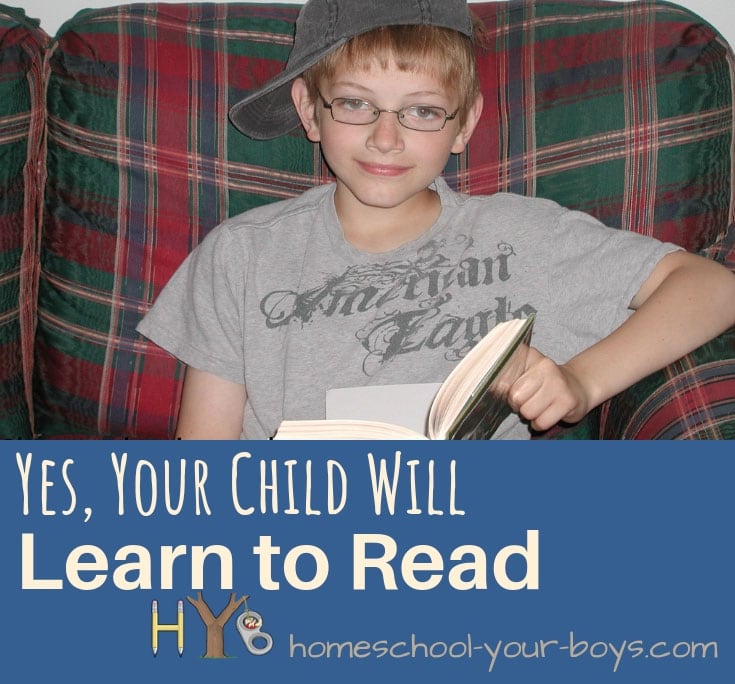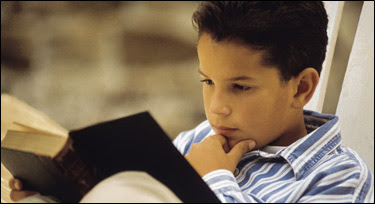Overview: Not all children learn to read in the same way or at the same age. Learn how to make teaching your child to read more enjoyable and less stressful.
If you are a beginning homeschool parent, you are probably eager to get started. You see how much your children enjoy learning and savor watching the light bulb moments as your kids grasp new concepts.
If you are homeschooling your kids from the very beginning, however, there is one common fear which grips many of our hearts:
“Will I be able to teach my child to read?”

I have to admit – I also struggled with these fears. We began homeschooling my oldest son when he was 2 years old!
We were living in a large city at the time and my husband and I knew there was no way we would feel comfortable sending our children to the public school there. We decided to try teaching our son preschool level material to basically dip our toes in the waters of homeschooling.
We didn’t want to commit to something we weren’t sure we could successfully accomplish.

The preschool years were filled with many happy memories. We had so much fun with all of the hands-on activities.
Schoolwork was fun for him! My son enthusiastically clung to learning and teaching was a joy.
We felt confident moving forward and committing to homeschooling our son through the school-aged years.
As our oldest son entered his kindergarten and first-grade years, however, school started to change. Besides hands-on activities, there were an increasing number of papers to fill out.
And we also started the process of teaching our son to read. I remember how terrified I was that I would “mess him up” by not teaching him correctly.
I asked many veteran homeschool moms the question, “What if he never learns to read?” I remember them all smiling at me and telling me that he would learn.
But that was still my biggest fear. I know how important reading is to everything else in our child’s education and I didn’t want to blow it.

Fortunately, reading came naturally to our first son. We went through various phonics programs and within a short period of time, he was reading and reading well.
He sped through the different levels of reading books and by the time he was in 2nd grade, he was reading The Chronicles of Narnia.
Phew, I had done it. I had taught my son to read. My confidence soared!
Will He Also Learn to Read?
When our second son got to the age where we were teaching him to read, however, he didn’t take to reading anywhere near as well as our first son had. In fact, he really seemed to struggle with reading.
We used some of the same phonics programs with him – and branched off to try different programs as well – but he just wasn’t progressing at the rate I thought he should. I used to listen to him read aloud Amelia Bedelia and Mr. Putter and Tabby level books for what seemed like forever.
This son had a hard time keeping his place in the book, so I would use my finger to point to each word until he was able to sound it out properly. I remember going to the library and searching frantically through the shelves for MORE books which were at the level my son could handle.
It was a very frustrating time.
I racked my brain trying to figure out why this son was struggling so hard when my first son had breezed through the entire process.
Reading continued to be a struggle for this son until he got about halfway through his third-grade year. He was having a difficult time transitioning from Henry and Mudge type readers to chapter books such as The Magic Treehouse series.
Then, all of a sudden, something clicked inside his brain. After having resisted reading any type of chapter book for several weeks, he suddenly flew through the Magic Treehouse books.
We haven’t looked back since.
In the second half of his third-grade year, he read more than 120 books on his own. These were various books such as biographies from the Childhood of Famous Americans series all the way up to Young Adult books like the Redwall series by Brian Jacques.
It was such a giant leap forward for him, after having struggled for so long, that I still shake my head in amazement when I think about it.

Here are some lessons I learned from going through all of this:
1 – Kids learn at different paces.
Just because they grow up in the same home and have the same parents, they are not the same. They will learn at different rates.
Don’t push your children too hard. If you run into a lot of resistance, it’s helpful to take a step back and even slow the pace for a bit. When they are ready, they will leap forward and surprise you with how quickly they catch up.
2 – Kids learn in different ways.
Relax and continue to try different methods with each child until you find one which works for them. Just because something worked for their older siblings doesn’t mean it will work for them.
Sell the old stuff on eBay and move on.
By the way, some children will require outside help because of having dyslexia or other learning difficulties. If you’ve tried lots of different methods and your child is still struggling, get them the help that they need.
3 – Don’t panic.
The more pressure you put on your child to perform, the longer the process may take. Try to be calm and patient and the process will be more enjoyable for both you and your child.
4 – Don’t move forward too quickly.
Sometimes you need to stay at the same level or even move backward a little in order to build up your child’s confidence. If you find your child is struggling, go back to books which he can easily read.
Let him stay there for a while before you try pressing ahead again. That may be just what your child needs in order to move forward later.
→ Related Content: Homeschool Reading Program: 9 Ways to Help Our Boys Enjoy ReadingThey will learn to read. People used to teach their children to read by using the only book they had in the house – a King James Bible. With all of the various phonics programs on the market today, there is something out there that will work for your child!
Resources for Learning to Read
If your child is ready to start learning to read or has been struggling to learn, there are many resources you can use. Some of my favorite resources for teaching kids how to read come from Usborne Books and More.

My First Reading Library – This comprehensive first reading library includes 50 books to guide your child through the first stages of reading and includes access to online resources. The first 22 books are taken from Usborne Very First Reading series. With these, your child takes the first steps in reading with your help, following the phonics methods used in schools.
The next 12 books are taken from Usborne First Reading Level One. These delightful and very short stories are for children to try reading themselves.
16 further books are taken from Usborne First Reading Level Two. These slightly longer stories will build stamina and reading confidence. Includes QR Codes.

My First Phonics Library – For beginner readers, these phonics-based books have text which is cleverly blended with a funny story. This set also includes a phonics guide for parents.
Includes the paperback edition of the following titles: Ape’s Great Escape, Bee Makes Tea, Bug in a Rug, Chimp with a Limp, Cow Takes a Bow, Croc Gets a Shock, Crow in the Snow, Flamingo Plays Bingo, Giraffe in the Bath, Goat in a Boat, Hyena Ballerina, Kangaroo at the Zoo, Lizard in a Blizzard, Llamas in Pajamas, Mole in a Hole, Raccoon on the Moon, Seal at the Wheel, Snail Brings the Mail, Spider in a Glider, and Underpants for Ants.
If you have any questions about helping your child learn to read, please ask. There are plenty of veteran homeschool parents out there who would love to answer your questions.
Never think that you are the only one facing a certain situation. Don’t be embarrassed.
We need to be honest with each other and help each other out when things don’t seem to be going as they should.
Fast forward to when my son was about to enter 5th grade and he was a voracious reader. All that time that I worried about his reading skills, I was putting myself and my son under unnecessary stress.
Your child will learn to read, compute math problems, spell, or whatever other skill with which your child may struggle. Take a deep breath and press on.
Someday your child’s progress will amaze you as well.
Question: Did any of your children struggle with learning how to read? Do you have any tips you could share with other parents? Please leave a comment below.



thank you, I am feeling more hopeful;)
I’m so glad! 🙂
Which phonics programs did you use for your boys? Is four the average age to start?
Four is actually young for starting phonics… especially with boys. I did start mine at a young age but they were showing signs that they were ready. If your son appears to be ready I would give it a try – but be ready to move slowly or back off if he struggles.
As for phonics programs, we used Bob Jones materials when my boys were that age. Have fun!!! 🙂
thank you, this is helpful.
not following any schedule/target, but taking baby steps in learning everyday. 🙂
Thank you so much !
You’re welcome! 🙂
Learning to read is like potty training. They have to be willing to focus on what they are doing, and some kids are later than others no matter how hard you try.
Amen! My boys struggled with reading for the longest time and then they suddenly caught on to it.
My oldest didn’t really read till 12yrs old, and then he wanted to read Don Quixote and speak Latin! We found out that he was an audio learner and took in everything we read orally and what he heard on cassettes. I was told he would not do well on standardize test, and he didn’t till 8th grade. He graduated from college, went on to grad school and has a job now that supports him well in NYC.
Oh, that’s so wonderful to hear, Lynn. Thank-you so much for sharing that encouraging story with us!
Oh wow! My ten year old is still not a fluent reader. He is a huge audio learner and has trouble tracking words on the page. He also deals with lots of perfectionism and a low frustration level. He has had lots of pressure put on him at different times in this journey. This year we are changing approach and I offer to sit with him while he reads to me, he always can refuse. Anyway, your story is encouraging. It
Has been a tough journey…
Oh yes, it is difficult when our kids don’t learn the way most people do. If he has trouble tracking the words on the page, there are various exercises you can do with him. You may want to check out Dianne Craft’s Brain Integration Therapy to see if that helps him. I wrote about our experience with it in this post, Smart Kids Who Hate to Write.
I am an early childhood educator and decided to write a book to help parents teach their children to read and write through sound. Anyone can download it for free.
http://www.letshelporphans.org/teach.html
Have fun and take your time.
Best wishes, Robert Holcomb
Do you have any insight regarding an 8 year old who cannot seem to recall the letter sounds? He knows them when he sees them individually but in reading, he will say the sound of “m” when he sees “r,” and others that don’t even look similar. We use Stevenson Learning Skills, a mnemonic reading program that begins with long vowel combinations. We listen to many audio books–he loved “Hatchet” and the other books in the series by Gary Paulsen. He loved “Tom Sawyer.” He recalls details of stories we’ve listened to months later. He is very physically active–a tree climber, runner, and give it his all in homeschool gym classes, etc. Any ideas of why he struggles with this?
You may want to check out a blog post called Smart Kids Who Hate to Write which I wrote about kids who struggle with writing. See if your son shares any of the symptoms I mention in that post and perhaps he would benefit from the brain training techniques I talk about in there.
I am really laughing at myself tonight. As I read the first line of this post I thought, “Oh, wow, my grandson is just like this!” And then I realized it was my own post! Well, just to say he is doing much better but still not a fluent reader. I will definitely check out the blog post you suggested. Thank you.
LOL Too funny!
Oh how we’ve struggles. Lots of tears from this momma!! My son just turned 9. That’s right, 9. He can read very easy readers super slowly. I’m just so thankful we have made it this far. I’m finally starting to see a light at the end of this tunnel. He is finally saying he wants to learn how to read. Before now he could care less about reading. We ‘ve tried a couple of different curriculums and now we are going to start from scratch again so I can build his confidence back up before we start to work on harder words.